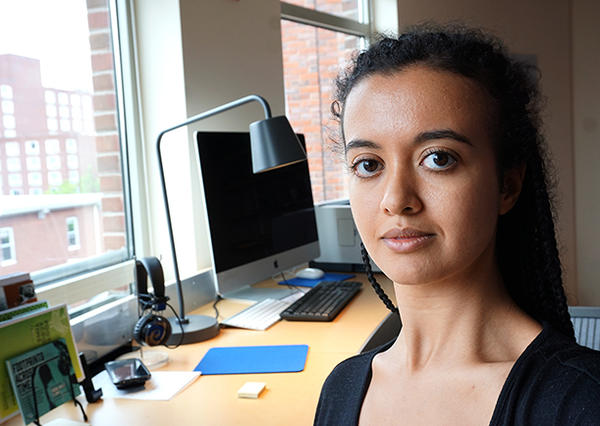Sophie Folger ’26
Staff Writer
Amy Alemu is an Assistant Professor of History, currently in her second semester as a faculty member at Scripps. Alemu’s work focuses on Ethiopian student activists organizing in response to revolution on U.S. campuses during the 1960s and 1970s.
Alemu was born and raised in Washington, D.C. and earned her bachelor’s degree from Harvard University. As an undergrad, she was initially on the pre-med track. “I’ve been nostalgic for my pre-med classes,” Alemu said. “I do kind of miss multivariable calculus.”
She ended up switching her major to history after taking a history design studio course: a hands-on class that combined learning about history with practicing the field in multimedia forms.
“There’s no definitive moment, but there is a sort of creeping realization,” Alemu said. “Something that medical doctors and historians can share is a sense of the work as vocation, so, it’s a sense of being in tradition, being part of the legacy of people who have committed their lives to this pursuit.”
After graduating, Alemu worked at a gallery doing digital media work and communicating exhibitions to public audiences. She then returned to Harvard, achieving a Ph.D. in African and African American Studies.
For her Ph.D. dissertation, Alemu studied Ethiopian and Eritrean student activists who would lead a revolution in Ethiopia in 1974, particularly their organizing at U.S. campuses during the 1960s and 1970s. This included researching Ethiopian and Eritrean leftism’s influences on black power concepts and thinkers and “trac[ing] those connected African diasporic traditions of leftism.”
Alemu had finished most of her archival research for her dissertation by the time COVID-19 travel restrictions were put into place, so during the lockdowns she spent most of her time writing. The fellowship group she normally met with weekly to discuss their dissertations switched to virtual meetings, which Alemu found challenging. “I strongly believe that we need to be in community to produce good writing and good research,” she reflected.
After graduating from her Ph.D. program, Alemu remained in Boston for a year and taught at Harvard in the Committee on Social Studies. She then joined the Scripps faculty last fall and taught a survey class in 20th century U.S. History and a seminar called Black International Politics.
This semester, Alemu teaches a Core 2 class on decolonization and a history seminar called Themes and Methods in African History. She described this class as “taking up what it means to do early historical work as a multidisciplinary or interdisciplinary practice.”
For all her classes, Alemu uses both secondary and primary materials to teach themes and methods, often bringing her students to the Denison Library to do archival work. In her short time at Scripps, Alemu has been impressed by her colleagues and students and the unique 5C and 7C model.
“I look forward to planning a course that would be something like building the cold war university,” Alemu said. “It would be multidisciplinary, so it would be history, but it would also maybe be architectural design, it would be sciences of higher ed and administration, and then, because of my interests, it would also incorporate students and how students navigate those spaces.”
Extending her dissertation, Alemu is currently working on a book. It is a comparative study of what she calls the U.S. Cold War University, specifically, how it is being designed, built, and administered, and its relationship to student unrest in Ethiopia. Similar to her dissertation, the book covers student organizing and campus and university design in the 1960s and 1970s. Alemu will be submitting proposals to editors in the fall and looks forward to seeing how her book will be situated in conversation with other works in the field.
In her professional life, Alemu would like to make an impact and embrace tradition in a way that will extend past her generation. “I really want to de-exceptionalize Ethiopian history with respect to African Studies, to really promote connective histories among African and African diasporic histories, and to situate place, and situate built environment in global ’60s student protest,” she said. “I always do want to create connections for the next generation to build on this work, with a special interest in those who are maybe new to this idea or the possibility of this profession.”
In her free time, Alemu enjoys watching television (she recently started watching The Last of Us), exercising, hiking in beautiful spots around the Claremont area, and having engaging conversations. She has some advice for Scripps students: “Don’t be afraid to be bold in your choices. Be bold in courses that inspire you and professors that inspire you, incorporate bold decisions…The idea of this kind of place and community is to learn without bounds, learn without limits. And hold your friends close to you as well.”
Image Source: Harvard University



